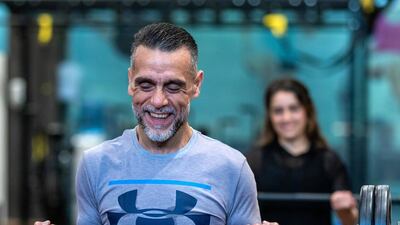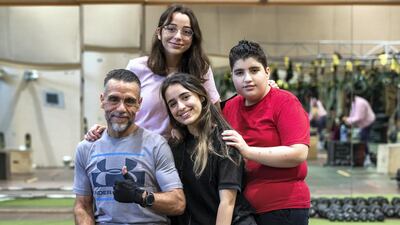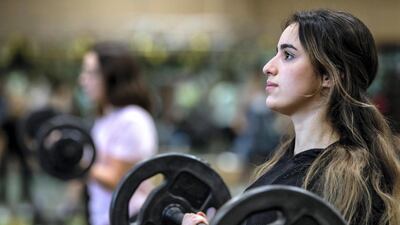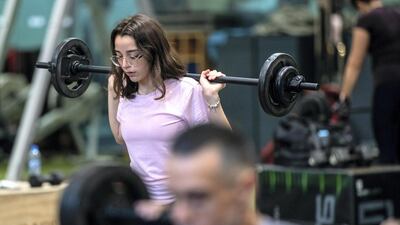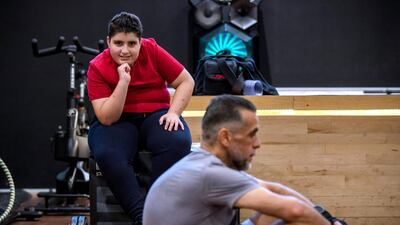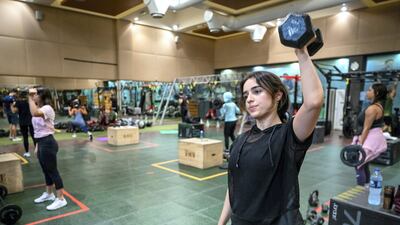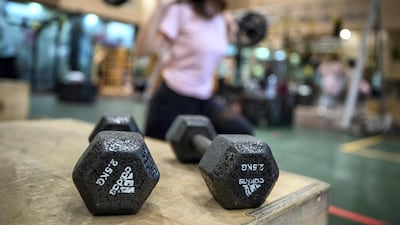Ihsan Sakka was born overweight – starting life as a big baby and weighing more than 4 kilograms at delivery, 500g heavier than the average newborn.
He struggled with his weight until he was a teenager.
"I always had an issue selecting clothes, and I always felt under the spotlight at social gatherings because of my size," said Mr Sakka, an ICT operations manager from Turkey.
“This stayed with me until I reached 95kg in high school. That moment was a shock for me.
“Until then, I was very slow and could not do any exercises, but at that point I started to do many exercises like swimming, running and karate, because I took a decision to reduce my extra kilograms.”
By the time he attended university, Mr Al Sakka had become an athlete who played several sports and followed a healthy diet.

“I was training, running, playing water polo and raft racing until in 2000 I had a very tragic accident, which caused huge damage to my back. I had to have two major surgeries,” he said.
Doctors told him not to walk for six months and said he could not work out for two years.
“I started eating a lot. If you play sports vigorously for two years and you suddenly stop, you get depressed and find a different release for your energy, which in my case was food,” he said.
Over the next decade he piled on weight, reaching 155kg by 2011 – heavier than he ever was in his teens.
"It was a dark area of my life. One day I went with my kids to the park, and I started to play football with them while carrying 155kg of bodyweight," he said.
“And I suddenly fell down, not because I was tired but because I could no longer breathe.
"That night I had a lengthy conversation with my wife and we decided that this had to stop.”
The importance of will power
That moment led him to undergo a gastrectomy, an operation in which all or part of the stomach is removed.
He followed a healthy diet and lost 85kg over the next nine years,
until Covid-19 began to spread around the world.
“The pandemic hit us all and we stayed at home for at least six months, and it was a very critical point for me. I started to gain weight again until I reached 95kg. I was scared to go back to my dark times," he said.
When sports centres reopened, he started running and swimming again "but it wasn't enough", he said.
“Then one day as I was taking my son out of swimming class at the Abu Dhabi Country Club and I heard the music blasting from one of the gym classes, and the instructor’s voice was booming out words of encouragement over the microphone," he said.
Too curious to walk away, Mr Sakka, 49, entered the huge studio to watch the circuit-training class being led by trainer Fernando Andrade from Les Mills Middle East.
“The coach then came to me and asked, 'Do you like it?' I said, 'I love it.'”
Mr Andrade advised him to start with spinning classes before taking on high-intensity workouts.
He also gave Mr Sakka advice about how to train and what to eat.
What came next was pure will power, said Mr Andrade, who often sees people become overexcited when they begin to lose weight, only to hit a wall and find it is more difficult to shift the kilograms.
This can lead to a drop in motivation and a return to an old, unhealthy lifestyle.
"What he did right was that he kept going. He was able to make it a daily routine and that is what made him succeed," Mr Andrade said.
A family affair
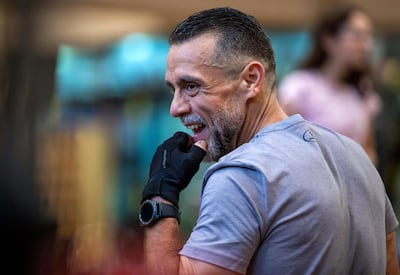
Today, the father-of-four is only 61kg and he leads a very healthy lifestyle.
He trains for about three hours a day, eats well and involves his family in the process, including his 14-year-old son, who has special needs.
Abdulvahab has a genetic condition called Prader-Willi syndrome that causes eating problems and weight gain.
In newborns, symptoms include weak muscles, poor feeding and slow development. Those affected become constantly hungry, which often leads to obesity and type 2 diabetes.
Mr Sakka said he could stand by and watch his son's health suffer.
Abdulvahab has become a regular at Abu Dhabi Country Club and he accompanies his father to some training sessions, including boot camp.
“I feel happy when I train, the coach lets me hold the [weight] plate and squat,” Abdulvahab said.
His eldest son Ali, 21, is an amateur boxer who regularly participates in championships.
Mr Sakka's daughters Nur, 20, and Hude, 16, are also regulars at the club.
“I have always been into sports, from a young age, because my dad used to tell me stories of how he won championships when he was younger,” Hude said.
Her sister started training last year. "The thing that motivated me was my dad. He pushed me to start – he said just come and try it out, you have nothing to lose," she said.

